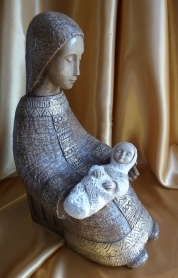 From the Dec. 2010 edition of the Body Builder, a newsletter published by Highland Park Church, Kokomo, IN. Used by permission.
From the Dec. 2010 edition of the Body Builder, a newsletter published by Highland Park Church, Kokomo, IN. Used by permission.
A number of America’s holidays have Christian overtones, particularly Thanksgiving, Christmas, and Easter. Because these holidays originated as times to celebrate God’s graciousness to us, it is not all that difficult to restore their original spiritual meaning. This will happen only if we value doing so and are willing to expend a bit of energy. I would like to share some considerations and suggestions.
My first consideration is that we become comfortable with the secular. As followers of Jesus Christ, we find ourselves in the world, though we are not of the world. This means we must walk the tightrope of participating in our society and its decent (good or neutral) ways, while at the same time refraining from its wrong ways.
Gift-giving, decorations, Christmas cards, rich treats, a Christmas tree, touring light displays, or gorging oneself with a Christmas meal are all part of the fun. Secular is not necessarily evil, but secular is not enough.
My second consideration is that we remind ourselves that we are not enslaved to traditions that may negate a truly blessed Christmas. We need not incur amazing debts or keep up with our siblings by matching extravagant gifts. Although most of us want Christmas to be a family time, we are free to dissent from family customs when those customs are offensive or counterproductive to our own families.
My third consideration is that we do not expect lost people to appreciate the real meaning of Christian holidays. Although the origin of Christmas, Easter, and Thanksgiving is religious, the Bible nowhere mandates these holidays; in fact, Christians did not celebrate Christmas until centuries after the time of Christ.
I believe God’s children should consider keeping Christ in Christmas, but they should not scold unbelievers who fail to do so. The annual “Christmas War” in our society is really an American/religious rights issue, not a biblical one.
Just as Christians who cannot even list the 10 Commandments often fight hardest to keep them posted in courthouses, so many Christians who gripe about others taking Christ out of Christmas do little to keep Christ in their own family celebrations. This sometimes frustrates me, I must admit. Rather than scolding lost people, maybe should begin sharing the gospel with them.




 From the Dec. 2010 edition of the Body Builder, a newsletter published by Highland Park Church, Kokomo, IN. Used by permission.
From the Dec. 2010 edition of the Body Builder, a newsletter published by Highland Park Church, Kokomo, IN. Used by permission.
Discussion